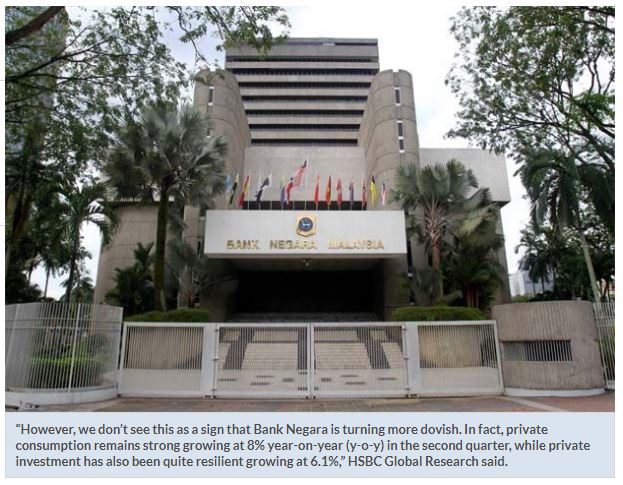Malaysia: Bank Negara seen focusing more on core inflation
PETALING JAYA: Bank Negara’s slightly more cautious tone on the state of the economy when it announced the overnight policy rate (OPR) is a reflection of the more challenging environment and growth risks that the country faces at the moment, says HSBC Global Research.
“However, we don’t see this as a sign that Bank Negara is turning more dovish. In fact, private consumption remains strong growing at 8% year-on-year (y-o-y) in the second quarter, while private investment has also been quite resilient growing at 6.1%,” the research house said.
“We expect both private consumption and investment to hold up in the short term, preventing the need for Bank Negara to loosen monetary policy to spur growth. Bank Negara is likely to focus more closely on core inflation in deciding its next policy move,” it added.
HSBC Research said that for the immediate term, the primary focus of the economy will be on the 2019 budget speech that will happen on Nov 2, which is when the government is scheduled to release any plans to cut spending or raise revenues.
Meanwhile, AmBank Economics Research said that the central bank’s move to keep the OPR unchanged at 3.25% was in line with market expectations.
It is expecting the central bank to maintain the current accommodative monetary policy for much of 2019, as external noises like the trade war, emerging-market issues and geopolitical noises are poised to stay and will have some knock-on effects on Malaysia’s external trade.
“On the domestic side, the upside to growth could be dented to some degree, pending greater clarity on some policy directions,” AmBank Economics Research said.
The research house said it had lowered its 2018 exports projection to between 6.5% and 7.5% from 8%–9% previously.
“This is in tandem with our reduction in the global export volume growth in 2018 from 4.8% to 4.4% partly due to external noises such as the trade war and also the impact from a high base. We expect the gross domestic product in 2018 to grow around 5.0% with a variance of 0.2% on the upside and downside,” it said.
According to official statistics, the trade surplus improved in July to RM8.3bil from RM6.0bil in June supported by better exports, while imports grew at a slower double-digit of 10.3% y-o-y compared to 14% in June.
Stronger exports were supported by electrical and electronic products, crude petroleum and the timber segment.
Imports were supported by capital and consumption goods, as a tax holiday boosted demand for durable and semi-durable goods.
Source: https://www.thestar.com.my/business/business-news/2018/09/07/bank-negara-seen-focusing-more-on-core-inflation/#9gFyqYB41ooaptIq.99


 Thailand
Thailand




